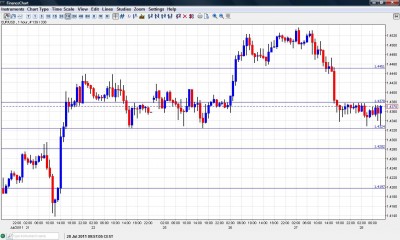Euro dollar is trading in a narrow and lower range, after it became clear that the tools that the EU has to fight the debt crisis are limited. Another disappointing employment report from Germany doesn’t help either. In the US, the “drop dead date” is getting closer, with an ongoing political deadlock. We have a few key figures today.
Here’s a quick update on technicals, fundamentals and what’s going on in the markets.
EUR/USD Technicals
- Asian session: A very quiet session saw the pair consolidating on lower ground, between 1.4325 to 1.4375.
- Current range 1.4325 to 1.4375.
- Further levels in both directions: Below 1.4375, 1.4325, 1.4282, 1.42, 1.4160, 1.41, 1.4070.
- Above: 1.4375, 1.4450, 1.4550, 1.4650, 1.47, 1.4775, 1.4882, 1.4940.
- 1.4325 is only minor support, with 1.4282 being a more important line on the downside.
- Also on the upside, 1.4375 is a limited cap, and 1.4450 is more significant.
Euro/Dollar sliding lower – click on the graph to enlarge.
EUR/USD Fundamentals
- 7:55 German Unemployment Change. Exp. -15K. Actual -11K.
- 12:30 US Unemployment Claims. Exp. 413K.
- 14:00 US Pending Home Sales. Exp. -1.5%. Here is a preview about how to trade USD/JPY with this event.
* All times are GMT.
For more events later in the week, see the Euro to dollar forecast
EUR/USD Sentiment
- US Debt Talks stuck within parties: The last news from the crisis comes from within the parties – also here, it is hard to get a consensus. The notion is that some temporary deal will be reached in the last moment. The current deadline of August 2nd is getting closer.There are various options for a resolving the situation.A rating downgrade of the US is on the cards and is already priced by the markets. But on the other hand, a US default will rock the markets and send the dollar down. See three options about how this crisis could unfold.
- EFSF powers limited: Despite all the agreements, doubt about the results is beginning to appear. The EFSF (bailout fund) will probably have the powers to intervene in the bond markets only towards the end of the year. This is a very long time. German finance minister Wolfgang Schaeuble said he is “against a carte blanche for the euro zone’s rescue fund to purchase bonds on the secondary market”. This mechanism is the key for preventing further bailouts. Spanish and Italian bond yields refuse to drop, with Spanish yields above 6%. Italy cancelled a planned bond auction. There are worrying signs in Europe.
- Doubts about the agreement: Schaeuble joins previous worries. Is this debt relief enough for Greece? Will the plan be approved by the national parliaments? And why shouldn’t Ireland default as well? Spanish bond yields are around 6% once again, and Italian yields are back to 5.55%. While the focus is currently on the US, this development is quite worrying.
- Slowdown in growth and in prices: It is not only peripheral countries that are struggling. Also Germany and France have reported a significant slowdown in activity, in both manufacturing and services sectors. And today, the wide IFO survey, that is usually positive, points to a soft landing for Germany. Now we also see that the demon of inflation isn’t that fierce. Next week, Trichet might sound more soft.
- US Growth? : Also in the US, a slowdown is apparent. Weak growth was seen in Q1, and all signs point to weak growth in Q2. The first estimation of US GDP in Q2 will be published tomorrow. Here is how to trade this event with EUR/USD.

